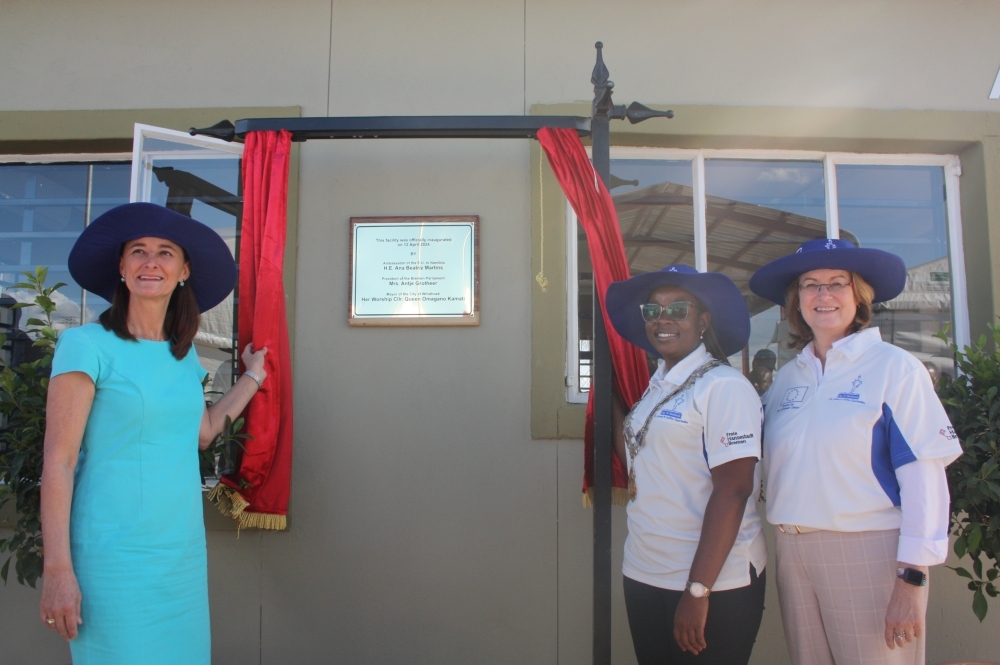EU-backed waste buy-back centre to boost jobs
In a bid to address pressing environmental concerns and foster economic resilience, Namibia celebrated the inauguration of its first-ever Waste Buyback Centre (WBBC) on Friday.
Situated in Katutura on Hans Dietrich Street, the centre marks a significant stride forward under the ambitious project 'Improving Solid Waste Management in Windhoek'.
The project is funded by the European Union (EU) in collaboration with the German city of Bremen.
With the dual goals of addressing trash accumulation and environmental deterioration, the WBBC aims to reduce waste, lessen detrimental environmental effects, encourage recycling activities and promote employment creation.
Waste management
Queen Kamati, Windhoek's mayor, emphasised the centre's important role in advancing environmental stewardship, bolstering economic empowerment and nurturing community development.
"This facility's establishment echoes the aspirations outlined in Namibia's 2018 national waste management strategy, positioning our nation as a regional leader in solid waste management standards by 2028, with a steadfast commitment towards waste reduction and achieving zero waste to landfill," Kamati said.
Ana-Beatriz Martins, the EU ambassador to Namibia, said the EU has contributed 2.2 million euros to the project since its inception in 2020.
Achieving joint goals
She said the project's overarching objective is to help Namibia transition towards a sustainable model known as a "circular economy," with Windhoek spearheading the pilot initiative.
"A transition to the circular economic principle not only reduces the environmental impact associated with resource extraction but also lowers greenhouse gas emissions and mitigates pollution. The establishment of the Waste Buy-Back Centre in partnership between the City of Windhoek, the City of Bremen and the European Union is a prime example of how the model translates into practice," Martins said.
In terms of the operational framework for the WBBC, Stellio Tsauseb, acting chief engineer for the City of Windhoek, emphasised the importance of waste separation in facilitating efficient recycling practices.
"By segregating various waste types, such as aluminium, polyethylene terephthalate (PET) and paper, we ensure not only cleanliness but also accurate measurement of each waste component," Tsauseb explained.
Income generator
The centre is implementing an incentive mechanism for waste contributors, with the option of receiving payments in cash or coupons redeemable at retail partners for a variety of goods, including food.
"The sorted waste will be weighed, and we will try to keep the rates fixed in line with international standards."
The centre is the first of two constructed through a joint partnership during the pilot phase, which is expected to run until March next year.
"We are looking to operate on a public-private partnership basis, but the City will remain involved in the administrative operations of the first centre during the pilot phase to properly understand the operational model before the second one is established in Havana during the pilot phase as well," Tsauseb added.
The sorted-out waste will be exported to countries such as South Africa for recycling.
Situated in Katutura on Hans Dietrich Street, the centre marks a significant stride forward under the ambitious project 'Improving Solid Waste Management in Windhoek'.
The project is funded by the European Union (EU) in collaboration with the German city of Bremen.
With the dual goals of addressing trash accumulation and environmental deterioration, the WBBC aims to reduce waste, lessen detrimental environmental effects, encourage recycling activities and promote employment creation.
Waste management
Queen Kamati, Windhoek's mayor, emphasised the centre's important role in advancing environmental stewardship, bolstering economic empowerment and nurturing community development.
"This facility's establishment echoes the aspirations outlined in Namibia's 2018 national waste management strategy, positioning our nation as a regional leader in solid waste management standards by 2028, with a steadfast commitment towards waste reduction and achieving zero waste to landfill," Kamati said.
Ana-Beatriz Martins, the EU ambassador to Namibia, said the EU has contributed 2.2 million euros to the project since its inception in 2020.
Achieving joint goals
She said the project's overarching objective is to help Namibia transition towards a sustainable model known as a "circular economy," with Windhoek spearheading the pilot initiative.
"A transition to the circular economic principle not only reduces the environmental impact associated with resource extraction but also lowers greenhouse gas emissions and mitigates pollution. The establishment of the Waste Buy-Back Centre in partnership between the City of Windhoek, the City of Bremen and the European Union is a prime example of how the model translates into practice," Martins said.
In terms of the operational framework for the WBBC, Stellio Tsauseb, acting chief engineer for the City of Windhoek, emphasised the importance of waste separation in facilitating efficient recycling practices.
"By segregating various waste types, such as aluminium, polyethylene terephthalate (PET) and paper, we ensure not only cleanliness but also accurate measurement of each waste component," Tsauseb explained.
Income generator
The centre is implementing an incentive mechanism for waste contributors, with the option of receiving payments in cash or coupons redeemable at retail partners for a variety of goods, including food.
"The sorted waste will be weighed, and we will try to keep the rates fixed in line with international standards."
The centre is the first of two constructed through a joint partnership during the pilot phase, which is expected to run until March next year.
"We are looking to operate on a public-private partnership basis, but the City will remain involved in the administrative operations of the first centre during the pilot phase to properly understand the operational model before the second one is established in Havana during the pilot phase as well," Tsauseb added.
The sorted-out waste will be exported to countries such as South Africa for recycling.







Comments
Namibian Sun
No comments have been left on this article